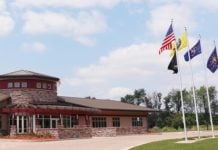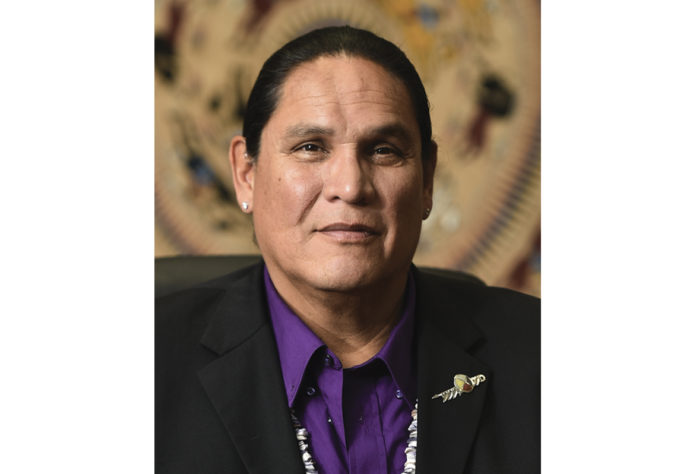by Ernest L. Stevens, Jr.
Eighteen months ago, in March of 2020, the world as we know it transformed due to the COVID-19 global pandemic. No one has been immune from the devastating impacts, which hit Indian Country especially hard from both health care and economic perspectives. We adapted quickly and continue to meet the challenges of going above and beyond to eradicate COVID-19 with the goal of successfully and safely building our tribal communities back and working to place this pandemic in its place in history.
The commitment of tribal leaders and communities has resulted in reports showing that Native Americans have a higher COVID-19 vaccination rate than any other major racial or ethnic group, and have become the model for broader vaccination efforts across the nation.
Throughout these unprecedented times, the economic backdrop of our tribal gaming industry was affected. Early 2020 revenue projections showed that tribal gaming would be down more than 50 percent over 2019 levels. However, Indian gaming operations began securely and safely opening their doors. Early indications for the first two quarters of 2021 show that tribal gaming is rebounding faster than expected, all while maintaining some of the most stringent COVID-safety protocols for all employees and patrons in the industry. Our tribal gaming regulators and operators led the success of this bounce-back effort with a safety-first approach.
In August, the National Indian Gaming Commission affirmed the success of our efforts when it released the FY2020 Gross Gaming Revenue totals. The NIGC reported a 20 percent decrease from 2019’s record-setting revenue of $34.6 billion. Simply put, our tribal gaming industry’s comeback during the worst pandemic in our lifetime produced $27.8 billion in Indian gaming revenues for 2020. It is a resounding affirmation of the hard work of our industry leaders working in close coordination with health experts and employees.
At the forefront of protecting our gaming industry is the many Indian gaming employees and regulators who stand firm in their commitment to keeping their gaming facilities and visitors safe by taking all precautions – everything from taking temperatures to wiping down machines and doing everything possible within their means to build upon the economic growth of our industry.
The NIGC also reported that the significant investments in public health, workforce development, and economic enterprise made by tribes during the pandemic limited the pandemic’s economic impacts, providing stability to operations and community strength. While these initial reports look promising, we know that our work is not over as we continue to work towards safely opening all tribal gaming properties to rebuild our industry.
Further, much work lies ahead to ensure this devastation is not revisited. We must all unite to do more to innovate our operations, diversify our economies, and strengthen our resilience to meet future challenges. To this end, at our home base in Washington, D.C., the National Indian Gaming Association continues to unite with our Member Tribes to organize outreach to Congress to meet this unprecedented challenge. In 2020 and early 2021, we succeeded in working with Congress to provide more than $40 billion in direct funding to tribal governments through the March 2020 CARES Act and the 2021 American Rescue Plan. These funds continue to help tribes meet the health and economic challenges of the pandemic.
Today, we continue to do our part to work closely with our partner tribal organizations to monitor Congress as they negotiate the $1.1 trillion bipartisan infrastructure package. The package, which passed the Senate in August of this year, provides more than $11 billion to Native communities to build and improve water and sanitation infrastructure, transportation and expand broadband access on Native lands.
The $11 billion within the Infrastructure Investment and Jobs Act allocates $3.5 billion for the Indian Health Service Sanitation Facilities Construction Program. It also includes $3 billion for the U.S. Department of Transportation Tribal Transportation Program, $2.5 billion to address approved Indian water rights settlements, and an additional $2 billion for the National Telecommunications and Information Administration Tribal Broadband Connectivity Program to expand broadband access on tribal lands and Hawaiian Homelands. Tribes and Native-serving organizations are set to receive additional funding to support transportation enhancement, energy development, water and sanitation construction, broadband deployment, climate resiliency, natural resource management, and environmental remediation, among other infrastructure priorities for Native communities. It is a priority because the lack of basic infrastructure was, in significant part, the primary reason tribal communities and families were vulnerable to COVID-19. We will continue to weigh in with Congress on this bill and stay committed to doing our part to represent the importance of including these critical needs outlined in the bill.
Each day as we work towards defeating this pandemic, continued diligence is essential because we still have to work ahead to finish this fight. To accomplish this, we must continue to reach out to everyone in our communities, encouraging the vaccine and mask wearing. Do it for the protection of others and yourself. Most importantly, do it for your community.
We will continue to work under the guidance of our Member Tribes of the National Indian Gaming Association. As we successfully did in July with our Indian Gaming Tradeshow and Convention, we will bring our membership to the table to do the work necessary to continue to build our industry. We plan to continue this movement by working hard in this new normal, always safe and careful, building upon the momentum and energy generated by our Annual Show and taking it to our Mid-Year Conference that will take place at the Pechanga Resort and Casino in Temecula, CA, November 15-17, 2021.
Ernest L. Stevens, Jr. is Chairman of the National Indian Gaming Association. He can be reached by calling (202) 546-7711 or visit www.indiangaming.org.















































